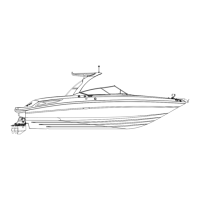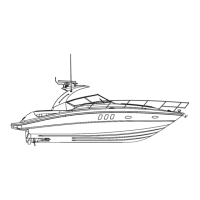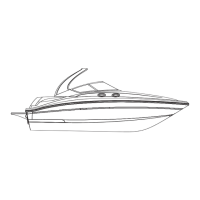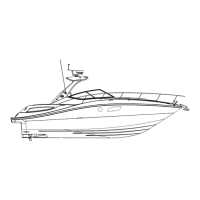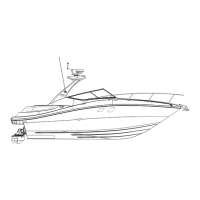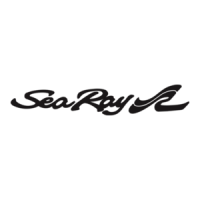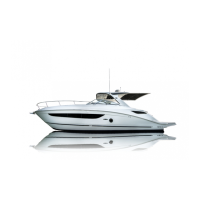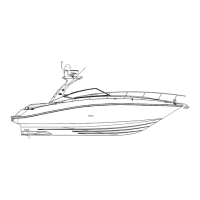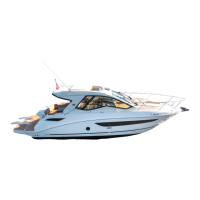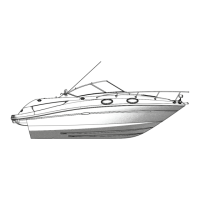Do you have a question about the Sea Ray 300 Sundancer and is the answer not in the manual?
Explains the meaning and importance of safety labels found on the boat.
Details required safety equipment for boats of specific lengths according to regulations.
Information on the boat's automatic and portable fire suppression systems.
Explains the dangers of carbon monoxide and how to prevent exposure.
Information on essential lifesaving equipment, including PFDs and their classifications.
Lists recommended equipment beyond legal requirements for enhanced safety.
Warns against operating the boat under the influence of drugs or alcohol.
Explains how to determine and adhere to the boat's maximum load and passenger capacity.
Discusses factors affecting boat stability and the risks of exceeding load capacities.
Emphasizes the importance of constant vigilance and safe operating practices for maintaining control.
Categorizes boat design capabilities for different weather conditions and provides weather-related rules.
Stresses the importance of charting a course and filing a float plan for safe navigation.
Safety guidelines for engaging in water sports like swimming and skiing.
Provides guidance on handling medical emergencies, water rescue, and fire situations.
Contact information for safety hotlines and boating safety resources.
Lists international standards and specifications the vessel complies with.
Addresses environmental regulations concerning fuel/oil spillage and waste disposal.
A glossary of common nautical terms used in boating.
A guide to understanding various symbols used on controls, gauges, and in the manual.
Illustrates the locations of important warning and safety labels on the boat.
Guidelines for proper boat handling during docking, lifting, and trailering operations.
Specifies safe areas for passengers while the boat is in motion or at anchor.
Describes the boat's stern drive propulsion system and its components.
Provides key physical dimensions and clearance specifications for the boat.
Illustrates the arrangement of equipment and features on the boat's upper deck.
Details the layout and components within the boat's mid-deck and cabin areas.
Explains the arrangement and function of gauges and controls at the helm station.
Identifies through-hull fittings and their specific functions on the boat's exterior.
Provides detailed explanations of essential boat operating controls and their functions.
Describes the function and importance of key gauges for monitoring boat systems.
Explains the operation and importance of navigation and anchor lighting systems.
Comprehensive checklist for pre-operation, launch, and post-trip boat inspections.
Guidance on safely launching and loading the boat onto a trailer.
Safe procedures and precautions for fueling the boat's gasoline and diesel systems.
Instructions for safe boarding of the boat, emphasizing passenger safety and weight distribution.
Information on the proper selection, use, and accessibility of PFDs for all occupants.
Guidelines for informing passengers about boat operation and ensuring their safe positioning.
Step-by-step instructions for safely starting the boat's engines, including pre-start checks.
Instructions for safely engaging forward or reverse gears and maneuvering the boat.
Procedures for safely shutting down the boat's engines and related systems.
Information on the boat's steering system, including maintenance and potential issues.
Explains the operation and components of the boat's windlass system for anchoring.
Covers fuel and oil spillage, drain plug operation, bilge pumps, and bilge blowers.
Procedures for installing and removing the hull drain plug for bilge drainage.
Detailed steps for safely removing and installing the boat's propeller.
Diagram showing the location of various bilge components and systems.
Overview of the boat's fuel system, including tanks, vents, and fuel fills.
Procedures for draining and replacing fuel filters to ensure optimal engine performance.
Essential safety precautions and checklists for fueling the boat to prevent hazards.
Introduction to the boat's 12-volt DC electrical system and battery maintenance.
Importance of ignition-protected components in gasoline environments to prevent sparks.
Guidance on replacing fuses and breakers with correct amperage ratings for safety.
Details the main DC breaker panel, its layout, and functions for various boat systems.
Explains the controls and functions of the cabin's DC distribution panel.
Overview of the boat's electronic switch pads and interface modules for controlling equipment.
Instructions on using the emergency start system to assist with engine starting.
Information on the location and use of 12-volt accessory outlets.
Details on the boat's various interior and exterior lighting fixtures and bulb replacement.
Explanation of the boat's AC electrical system, including shore power and generator operation.
Procedures and precautions for connecting to and disconnecting from shore power.
Guidelines for safely accessing and servicing the main electrical distribution panel.
Reference to electrical schematics and wiring diagrams for technical service.
Details the controls and functions of the cabin's 120-volt AC main distribution panel.
Information on the automatic battery charging and conversion system.
Explains the function and importance of GFI receptacles for electrical safety.
Recommendations for operating and maintaining the onboard generator.
Explains how to prevent electrolytic corrosion and maintain zinc anodes.
Details the Mercathode system for protecting underwater metals from corrosion.
Diagrams illustrating wire harness installations for various boat systems.
Contains detailed electrical wiring diagrams for various boat systems.
Guides users to locate and familiarize themselves with important equipment and components.
Information on the operation, maintenance, and starting procedures for the HVAC system.
Covers the fresh water system, including operation, sanitizing, and winterizing.
Details on head system options, operation, holding tanks, and waste disposal.
Information about the boat's entertainment system components and their operation.
Explains the function and indicators of the automatic fire suppression system.
Describes the optional bow thruster system for enhanced maneuverability.
Instructions for operating the refrigerator/freezer on both DC and AC power systems.
Information on the power ventilation system for removing air and odors from interior spaces.
Instructions for operating the electric windshield vent system.
Details on operating and maintaining the drip coffee maker.
Information on operating the electric stove, including safety features.
Instructions for operating the microwave oven.
Guidance on canvas installation, trailering, and care for various canvas components.
Information on operating the boat's horn and its associated circuit breaker.
Instructions for operating the boat's spotlight system.
A comprehensive summary table of required maintenance intervals for boat systems.
A form to record important boat specifications and service details.
Detailed procedures for inspecting and maintaining critical boat systems like bilge, engine, and fuel.
Steps for properly winterizing the boat's systems for storage.
Procedures for preparing the boat for use after a period of storage.
Recommendations for securing the boat and its contents when unattended.
Instructions for lubricating seacocks to ensure proper operation and prevent seizing.
Guidance on maintaining the boat's power steering system for optimal performance.
Describes the system and procedure for changing the engine oil.
A quick checklist for general boat operations, system checks, and engine status.
A checklist for verifying the seaworthiness and condition of added aftermarket equipment.
A logbook for recording all maintenance performed on the boat.
Precautions and recommendations for using cleaning agents and refinishing materials safely.
Guidelines for cleaning, waxing, and maintaining the boat's fiberglass and gelcoat surfaces.
Advice on removing stains and minor scratches from the boat's finish.
Methods for preventing marine growth on the hull when permanently moored.
Instructions for cleaning and maintaining the boat's bottom paint.
Cleaning and maintenance advice for stainless steel fittings and salt crystals on instruments.
Proper methods for cleaning and maintaining acrylic plastic surfaces.
Guidance on cleaning, storing, and maintaining canvas and clear vinyl components.
Recommendations for cleaning and maintaining exterior upholstery fabrics.
Information on cleaning and maintaining interior upholstery fabrics.
